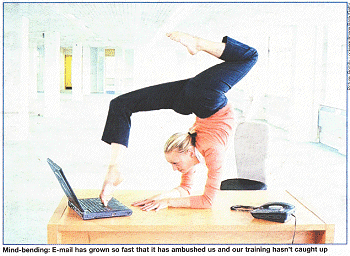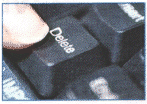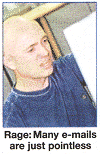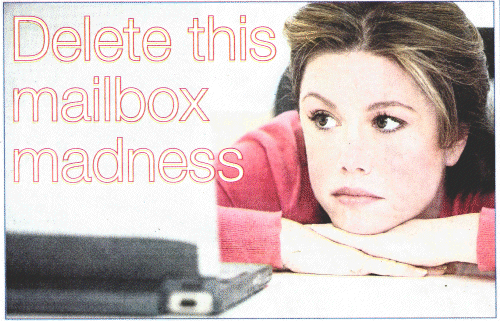
Author PAUL JOHNSON describes how we can learn to E-mail to live,not live to E-mail
Face-to-face communication involves language, facial and verbal expression, vocal intonation, body language, eye contact, physical composure, touch, smell and more. It allows unambiguous communication. Now change the method of communication and watch how these facets begin to fade. As each one vanishes, it takes away an element of clarity and starves the recipient of vital clues. Switch from face-to-face to telephone and, with it, you lose facial expression, body language, eye contact, physical-composure, touch and more.

Beat the system
Revert to written communication and you lose non-verbal expression and
intonation. In effect, through the shift to writing, you reduce your
communication toolkit from a strong portfolio of, say, ten items, to a weak
toolkit of two based solely around the discipline of the written word.
We have, in effect, an unskilled and largely untrained global e-mail workforce.
This new technology has grown so fast as to ambush the office. We haven't
fully noticed and all the usual office defences of training and operating
protocols have not yet caught up. One important tip is to think about whether
you need to e-mail in the first
place.
Your colleagues hold so much information about the business - its activities,
its people, customers and general news that it pays to immerse yourself in
your real-life context. In many cases, more than 50 per cent of e-mails are
sent to people in the same office. The next time the e-mail system fails,
use the time to go and speak to people about the issues you were just about
to e-mail them on. Get out there and meet colleagues.
Below are a few general rules for negotiating the e-mail quagmire. Alternatively,
you could do as a reader commented on the Email Survival Guide website: 'I
don't worry about most of my e-mails. I just wait until they - call me. Then
you know they have a real issue for me to deal with.'
Email: the new rules
- Mix communication tools, blending the electronic with the traditional. Your message will have more depth. be better regarded and, ultimately more successful. If we lose the ability to communicate face-to-face, then we might as well pack up now; it's over.
- If you don't need it, delete it. Remember why you need to keep information. Theoretically it's because you may need to refer back to the material. Not because you are paranoid or like to hoard. The strength of the delete button is the feeling of freedom it provides. You will remember most of what you save but forget most of what you delete. And with e-mail, you need to forget most things.
- Determine the categories you need to retain. Decide how long each category should be kept and then develop a mechanism to 'store and destroy'. Set dates for deletion against each category of data storage. Don't forget to 'spring clean'. Once every three months or more, review your e-mail and delete. Deletion should not be haphazard but programmed, planned and perfected.
- Try to eliminate being alerted to incoming e-mail. Plan your day and allot a certain amount of time to review incoming mails (looking over your inbox, sending brief responses and then allocating a date, time and duration to work on more complex responses). Then split that time into a 30:70 ratio in morning and afternoon sessions.
- Set up an 'Inbox Action' folder; with subfolders to denote the status of the messages therein. Typical subfolders could include: To Be Reviewed, Immediate Action, Action within 72 Hours, Action Scheduled and No Action - Return within 72 Hours. After each daily e-mail review, the Immediate Action box should always be empty.
- An experienced operator- can set their inbox to drop e-mails from 'important' individuals into an action folder and so are able to focus most of their attention on this correspondence.
- Prioritise and allocate review time to address 'To' messages first, with CC e-mails receiving attention only if time is available. In turn, try to send e-mails 'To' individuals rather than by 'CC'. A smaller distribution makes the point that the material is for each recipient's attention and there is a greater likelihood of a response.
Edited by FIONA MACDONALD atmetro@ukmetro.co.uk
